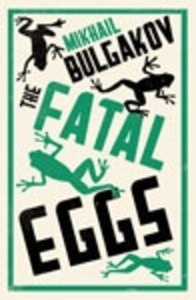The Fatal Eggs

Editorial Alma Books Ltd
Fecha de edición julio 2014 · Edición nº 1
Idioma inglés
EAN 9781847493712
Libro
encuadernado en tapa blanda
Resumen del libro
Professor Persikov, an eccentric zoologist, stumbles upon a new light ray that accelerates growth and reproduction rates in living organisms. In the wake of a plague that has decimated the country's poultry stocks, Persikov's discovery is exploited as a means to correct the problem. As foreign agents, the state and the Soviet media all seize upon the red ray, matters get out of hand
Set in 1928 but written four years earlier, during Stalin's rise to power, The Fatal Eggs is both an early piece of science fiction reminiscent of H.G. Wells and a biting, brilliant satire on the consequences of the abuse of power and knowledge.
Biografía del autor
x{0026}lt;P x{0026}lt;B Mijaíl Bulgákovx{0026}lt;/B (1891-1940) nació en Kiev, Ucrania, y estudió medicina aunque renunció al ejercicio a favor de la creación literaria. Entre sus primeras obras destacan x{0026}lt;I Maleficios x{0026}lt;/I (1925), x{0026}lt;I Corazón de perrox{0026}lt;/I (1925) y x{0026}lt;I Morfina x{0026}lt;/I (1927). El reconocimiento le llegó con la novela x{0026}lt;I La guardia blancax{0026}lt;/I (1925), que posteriormente fue dramatizada con el título x{0026}lt;I La huidax{0026}lt;/I (1926). Se enfrentó por ello a la crítica oficial por su favorable retrato de un grupo de oficiales antibolcheviques durante la guerra civil y por la falta de un héroe comunista. Aunque sus obras disfrutaban de gran popularidad, su sátira de las costumbres soviéticas le valió la prohibición a publicar a partir de 1929. Su obra más conocida, x{0026}lt;I El maestro y Margaritax{0026}lt;/I (que no se publicó en la Unión Soviética hasta 1966) fue escrita entre 1929 y 1940, año de la muerte del autor. La fama de Bulgákov se vio reforzada a partir de 1962 por la publicación póstuma de sus novelas, obras teatrales y la biografía x{0026}lt;I Vida del señor Molièrex{0026}lt;/I .x{0026}lt;/P








